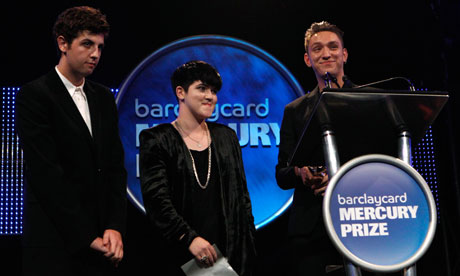
Thursday, September 30, 2010
Tuesday, September 28, 2010
Julia
The plot of Julia sounds insane and implausible on paper: a mentally ill mother, Elena, enlists the help of her neighbor, Julia (Tilda Swinton), to permanently kidnap her son, Tom, who is "imprisoned" by his wealthy and "evil" grandfather. If Julia helps in the kidnapping, Elena would give Julia a large reward. Julia, who is a completely dysfunctional alcoholic, agrees to help but, on her own, plans to double cross Elena by kidnapping Tom and asking for an even larger ransom. But, as the best laid plans of mice and men often go awry, when Julia actually kidnaps Tom, Tom is then kidnapped by Mexican kidnappers when she accidentally drives across the border while escape authority.
Sounds impossible right? I would think so. But somehow Erick Zonca, a French director, made it all work with incredible realism. Julia is one of best thrillers I have seen this year. I literally held my breath for the last 5 minutes. I wish I had seen it earlier. It was on my Netflix queue for quite a long time. However, since I never read any articles or heard any publicity about the film, I never got the motivation to watch it. But last time, I was craving for a thriller and felt I was finally time to give it a try.
It sure did not disappoint. Tilda Swinton's performance is mesmerizing. There's nothing glamorous about her character though; in fact, she was uglified for the role kind of like Penelope Cruz in Don't Move. She is a complete drunk, cannot get her act together, does not even think of herself as an alcoholic, and creates a huge web of lies where she herself gets entangled. She parties all night, sleeps with random men, and looks like a total mess the morning after. Swinton as Julia is raw, surreal, and utterly incredible. I am so surprised that this film and her performance for this character did not garner more attention and accolades in the United States. If she was good in Michael Clayton as Karen Crowder, Tilda as Julia is 50x better than the Karen during the bathroom scene.
Sounds impossible right? I would think so. But somehow Erick Zonca, a French director, made it all work with incredible realism. Julia is one of best thrillers I have seen this year. I literally held my breath for the last 5 minutes. I wish I had seen it earlier. It was on my Netflix queue for quite a long time. However, since I never read any articles or heard any publicity about the film, I never got the motivation to watch it. But last time, I was craving for a thriller and felt I was finally time to give it a try.
It sure did not disappoint. Tilda Swinton's performance is mesmerizing. There's nothing glamorous about her character though; in fact, she was uglified for the role kind of like Penelope Cruz in Don't Move. She is a complete drunk, cannot get her act together, does not even think of herself as an alcoholic, and creates a huge web of lies where she herself gets entangled. She parties all night, sleeps with random men, and looks like a total mess the morning after. Swinton as Julia is raw, surreal, and utterly incredible. I am so surprised that this film and her performance for this character did not garner more attention and accolades in the United States. If she was good in Michael Clayton as Karen Crowder, Tilda as Julia is 50x better than the Karen during the bathroom scene.
In addition to Tilda's performance, Aidan Gould who plays the boy Tom adds a great touch to the film. He is a likable and quirky character with extremely extremely bad luck and just gets caught in the middle of all this mess! He was playing in the river wearing a speedo when Julia kidnaps him. Then he gets taken to Mexico during his sleep while Julia drives like a mad woman. Then he gets kidnapped a second time! And throughout the movie, someone is always pointing a gun at him, and he has the least clue of what is going on. Aidan really needs to be in the next Wes Anderson film. He would be a perfect fit.
At 2 hours and 30 minutes long, Julia can be a bit tiring at points especially in the desert scenes (think--the scene in Babel where the nanny tries to find the children in the desert). But even at 2 hours and 30 minutes, Julia is a truly exciting drama-thriller where the plot and characters are out of this world, and it has its touching and amusing moments of poignancy, sheer panic, and heavy absurdity.
Monday, September 27, 2010
Jeff Koons for Kiehl's
I rather like Jeff Koons. Some may (actually many do) consider his works kitsch, but I think his use of stainless steel in his Celebration series to sculpt balloon animals, egg shells, and ribbons is the most interesting use of material I have seen. There are many more things to say about Koons' art like how strange it is look at his innocent balloon animals after having seen his Made in Heaven series.
But, in more recent event, Koons has partnered with Kiehl's to create limited edition of Kiehl's Creme de Corps line of products.


The good of all this? Proceeds from the sale will benefit the Jeff Koons Family Institute, a non-profit organization. Here's an excerpt with more information from the website:
"We are proud to partner with famed modern artist Jeff Koons in recreating our classic Creme de Corps labels in support of The Jeff Koons Family Institute, a non-profit organization that seeks to reunite children and families across the world and combat child exploitation in all its forms.
100% of Kiehl’s net profits from the sale of Limited Edition Creme de Corps will support The Jeff Koons Family Institute. Kiehl’s donation will encourage countries to join and adhere to international conventions protecting children and help put in place national-level programs for missing and exploited children across the globe."
I actually use something from the Creme de Corps collection. It's pretty good. So if you are running low and want to try a new lotion, consider Kiehl's! You will be helping some children out!
 |  |
But, in more recent event, Koons has partnered with Kiehl's to create limited edition of Kiehl's Creme de Corps line of products.

These limited edition items feature, on the label, a reproduction of Koon's Tulips from his Celebration series which is an oil painting made to look like his stainless steel Tulips.

The good of all this? Proceeds from the sale will benefit the Jeff Koons Family Institute, a non-profit organization. Here's an excerpt with more information from the website:
"We are proud to partner with famed modern artist Jeff Koons in recreating our classic Creme de Corps labels in support of The Jeff Koons Family Institute, a non-profit organization that seeks to reunite children and families across the world and combat child exploitation in all its forms.
100% of Kiehl’s net profits from the sale of Limited Edition Creme de Corps will support The Jeff Koons Family Institute. Kiehl’s donation will encourage countries to join and adhere to international conventions protecting children and help put in place national-level programs for missing and exploited children across the globe."
I actually use something from the Creme de Corps collection. It's pretty good. So if you are running low and want to try a new lotion, consider Kiehl's! You will be helping some children out!
Sunday, September 26, 2010
Looking forward to
The King's Speech directed by Tom Hooper, starring Colin Firth, Helena Bonham Carter, and Geoffrey Rush won the People's Choice Award at this year's Toronto Film Festival.
This seems like one of those semi-epic, kind of serious but with a dry wit, slightly romantic, a bit inspirational, Best Picture-nominated but don't win, and, ultimately, highly polished and well-directed films. Think The Young Victoria, Atonement, An Education, The Reader, The Queen, Finding Neverland, and Elizabeth: The Golden Age. Funny that they are all British films.
Thursday, September 23, 2010
Saturday, September 18, 2010
Tuesday, September 14, 2010
Stolen
In some ways, documentary is emerging as one of my favorite genres of film. Before, I kind of had the preconceived notion that documentaries lack style, artistry, direction, narration among many other things. Documentary film, to me, was a way to collect facts, interviews, video footages and present all these elements together as a body of work. Documentaries were passive, apolitical, and historical; they did not do more than to just present an event, a person, or place.
But today, documentaries have very strong messages and are on a mission to deliver the "truth" according to their directors, however how impartial the truth is. They certainly have style and some of the most unique narration. They can be touching, infuriating, and life changing. For me, my respect for documentary started with An Inconvenient Truth. Then it reached a new height with Sicko, my favorite documentary of all time along with Chernobyl Heart, a short feature. And now Stolen.
As I wrote earlier, documentary has in some ways emerged as one of my favorite genres of film. It is one of my favorites because, more than often, it hits a subject matter that I am passionate about. (If most documentaries have a conservative, right-leaning voice, I probably wouldn't be watching any of it. But let's just face it, documentaries are mostly liberal, leftist, environmentally friendly, peace-loving. The entertainment industry is one that is not conservative except for maybe the AMPAS.) A subject that I am more interested in than anything else is art, especially Johannes Vermeer.
Stolen is a documentary on the Isabella Stewart Gardner Museum art heist--the biggest in America. An estimated $200 to $300 million worth of art was stolen including Rembrandt's only seascape, several Degas, a Manet, and one of only 36 Vermeers in the world. Because of the rarity of Vermeers and the quality and significance of the Vermeer, the documentary focused largely on the this one painting.
What I liked about Stolen is the frame story, detective approach that it took to try to solve the crime and get the painting back. It interviewed art historians who put an amazing perspective on the atrocity of this crime. But mostly, it followed a detective, who specialized in art theft, on his attempt to recover the painting. The film dove so deep into the crime that the film maker and detective were literally one person away from getting the paintings back. The film also revealed the darkness of this art heist--how the mafia in Boston and in Ireland are involved, how politicians could bring the paintings back, how the FBI is more interested in catching the thieves than recovering the paintings, and even how religion can a part of the recovery process.
Needless to say, Stolen is one documentary that is extremely interesting. But of course, it has its downsides. Stolen reaffirms my stereotype that documentaries can have no style, artistry, direction, or narration. This film is carefully organized so that everything made sense, but it lacked creativity. Aesthetically, it might be no better than a home movie. It is, however, just that--a very low budget documentary that was made for television. Still, if you are interested in Vermeer, art thefts, Isabella Stewart Gardner, or her museum, Stolen offers more insights into these topics than one could ask for.
Monday, September 13, 2010
Winners everywhere!
What a great week for some of my favorite artists. My last post was dedicated to Sofia Coppola, the winner of this year's Venice Film Festival's top prize--the Golden Lion--for her newest film Somewhere.
Last night, Lady Gaga won multiple MTV's Video Music Awards(almost every category she was nominated for) for her videos Bad Romance and Telephone. Yay for Eminem's wins as well. Before his latest album, Recovery, I did not like him for the most part. But I feel like he has emerged this year with more maturity and humanity (at least with the two singles released so far).
 And lastly, The xx won UK's Mercury Prize beating 11 other nominees.
And lastly, The xx won UK's Mercury Prize beating 11 other nominees.

Last night, Lady Gaga won multiple MTV's Video Music Awards(almost every category she was nominated for) for her videos Bad Romance and Telephone. Yay for Eminem's wins as well. Before his latest album, Recovery, I did not like him for the most part. But I feel like he has emerged this year with more maturity and humanity (at least with the two singles released so far).
 And lastly, The xx won UK's Mercury Prize beating 11 other nominees.
And lastly, The xx won UK's Mercury Prize beating 11 other nominees.
P.S. Lady Gaga's meaty dress has been done before. In 2002, contemporary Chinese artist, Zhang Huan, wore a meat suit in his performance art piece My New York. The idea was quite similar--post 9/11, Huan walked through the streets of NYC in a muscle/meat suit to symbolize the strength of New Yorkers.
Saturday, September 11, 2010
Friday, September 10, 2010
The Cove
After I watch a movie, I always read as much as possible online about the movie, the subject matter, the stars, production notes, and the like. Especially for a film in the historical/period and documentary genres, I want to know how accurate and impartial a film is. Documentaries are nearly always unapologetically one-sided and so it's interesting to seek out what the other side has to say.
Most of the time, I wholeheartedly agree or sympathize with the message or goal of the documentary for example Sicko, Food Inc., and An Inconvenient Truth. But I felt a little bit uneasy about The Cove, a bit reluctant to embrace the message of it all.
Most of the time, I wholeheartedly agree or sympathize with the message or goal of the documentary for example Sicko, Food Inc., and An Inconvenient Truth. But I felt a little bit uneasy about The Cove, a bit reluctant to embrace the message of it all.
The Cove won the Best Documentary Feature at this year's Academy Awards. To me, it mainly documented the journey of a group of American activists who go to Taiji, Japan, where an annual hunting/slaughtering of dolphins take place. And along the way, Ric O'Barry, the man who is at the center of the mission to stop this dolphin killing tradition, explains why he became involved. My favorite part of The Cove is how the crew tried to document this event. The fishermen in Taiji who partake in the killing obviously do not want outsiders to see what really happens in the cove. Thus the area is heavily fenced and guarded by local police. To get footage of the killing, the camera crew had to sneak around at night with night and thermal vision cameras. This part of the film is a very exciting and a bit Mission Impossible like.
What we ultimately see is the undeniable truth. Pathetic method of driving the dolphins into the dove. Cruel slaughtering of dolphins. Heartbreaking footages. And blood. Lots and lots and lots of blood. At the end, it is impossible to feel sorry for the helpless and hopeless dolphins who are obviously suffering a lot of pain. And I cannot help to feel disdain for the people who are a part of this killing. The hunt is disgusting, hateful, and barbaric. (Those are probably the harshest words I've ever used in this blog.)
But going back to what I said earlier, I try to read upon the film and its subject matter after the viewing. What I found is a bit too much discrepancies between the accounts of how the footages were shot. I really do not like how the Japanese fishermen said that originally Ric O'Barry went to Taiji for a different purpose. Yet the film portrays the film crew as being there for the purpose of documenting the dolphin hunt from the start. Furthermore, I dislike how there is the "white man's burden," "the West telling the East how to live" sort of point of view. So in the end, I am not entirely sure if the people involved in this film are as noble as they appear to be.
Wednesday, September 8, 2010
Monday, September 6, 2010
The Duchess
Netflix recently added a lot of films that I've been waiting to watch to its Watch Instantly section. (Let me take a moment to say how great Netflix is. If you are bored, on an "extended summer break"/taking forever to find a job, I highly recommend you subscribe to Netflix. At around $9 a month for unlimited Watching Instantly online, it's pretty worth it. And their Watching Instantly section is growing and getting much much better. If you are skeptical, you can always do the free month trial.) The last film I reviewed, Mother, is a newly added one. The Cove, the awarding documentary, was also added so I shall be watching that soon. I decided to watch The Duchess as I felt I needed to watch a period film, and I always love films about aristocrats, kings and queens.
Lastly, she's so well spoken in this interview!
(I really don't like the Princess Diana reference in the beginning of the trailer. But the rest of it is better than others.)
I wouldn't say this is a period film about nobilities that is particularly groundbreaking or memorable. Honestly, I didn't even like Keira Knightley in her role as Georgiana, Duchess of Devonshire. I thought she lacked the gravitas, weight to play such a role. There are a few moments, however, where she is pretty good. I also find the casting of Dominic Cooper questionable. On the other hand, I thoroughly liked Ralph Fiennes, as the Duke, and Hayley Atwell, as his mistress Lady Bess Foster. (Hayley Atwell is Lady Julia Flyte in Brideshead Revisited, another great role that I really enjoyed watching.)
But The Duchess is a pretty interesting film while it lasted. The plot and the relationships between the characters have some very good complexity. There are many moments in the film where I felt sympathetic towards a character while disliking others. And there are moments of redemption where I started to like the characters who I previously hated. Moreover, there is one slightly scandalous scene where Georgiana and Lady Bess' relationship is darkly explored.
To sum it up, The Duchess is slightly better than The Other Boleyn Girl, not as good as The Young Victoria, and a watered down, less creative Marie Antoinette. But I still love Keira Knightley and I am looking forward to her next film Never Let Me Go. Can you believe she's only 25?
Lastly, she's so well spoken in this interview!
Saturday, September 4, 2010
Mother
South Korean director Bong Joon-ho did it again with his latest film Mother, which I have been highly anticipating since hearing about it at last year's London Film Festival.
If you haven't heard of Bong Joon-ho, I wonder if you live under a rock. His most famous film, The Host, premiered at the Cannes in 2006, landed on several 2007 top ten lists, AND is the highest grossing South Korean film ever! So before you watch Mother, you should watch The Host or after...up to you.
To me, Bong Joon-ho is emerging as one of the most refreshing auteur. His films have such a great balance of drama and dark comedy. While watching his films, I often found it absurd that I am laughing at some of the scenes because they are so dark and serious yet awkward. I don't think I have experienced the same feeling while watching films by any other filmmaker. In addition, Bong's films are never dull; the pace is so well balanced, and the music always so perfectly paired with every scene.
Anyways, Mother is about a mother who tries relentlessly to save his slightly slow adult son from imprisonment. Her son, who is known as a gentle, harmless person in town, is accused of murdering a girl. Running around town, collecting evidence, sneaking around at night, the elderly mother (the mother is actually never given a name) discovers scandals, secrets, and crosses path with some interesting characters. The ending of the film is one that is highly rewarding and twisted; it adds a powerful punch to the film. Also, did I mention the acting by Kim Hye-ja, the mother, is brilliant?
If you haven't heard of Bong Joon-ho, I wonder if you live under a rock. His most famous film, The Host, premiered at the Cannes in 2006, landed on several 2007 top ten lists, AND is the highest grossing South Korean film ever! So before you watch Mother, you should watch The Host or after...up to you.
To me, Bong Joon-ho is emerging as one of the most refreshing auteur. His films have such a great balance of drama and dark comedy. While watching his films, I often found it absurd that I am laughing at some of the scenes because they are so dark and serious yet awkward. I don't think I have experienced the same feeling while watching films by any other filmmaker. In addition, Bong's films are never dull; the pace is so well balanced, and the music always so perfectly paired with every scene.
Anyways, Mother is about a mother who tries relentlessly to save his slightly slow adult son from imprisonment. Her son, who is known as a gentle, harmless person in town, is accused of murdering a girl. Running around town, collecting evidence, sneaking around at night, the elderly mother (the mother is actually never given a name) discovers scandals, secrets, and crosses path with some interesting characters. The ending of the film is one that is highly rewarding and twisted; it adds a powerful punch to the film. Also, did I mention the acting by Kim Hye-ja, the mother, is brilliant?
Subscribe to:
Comments (Atom)









